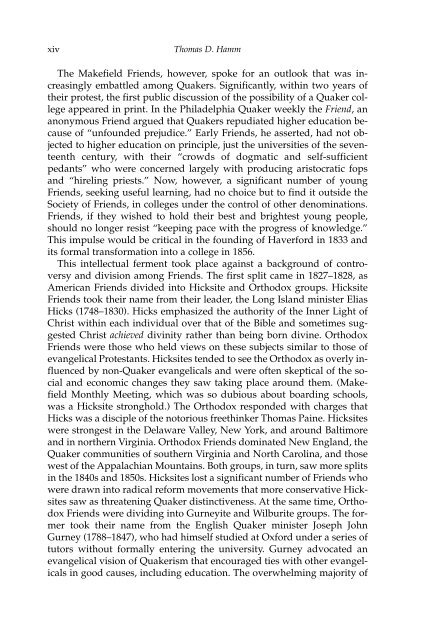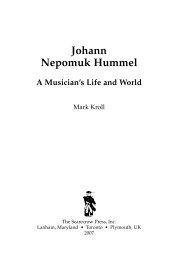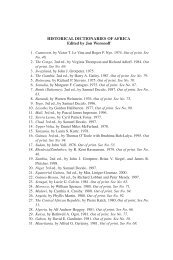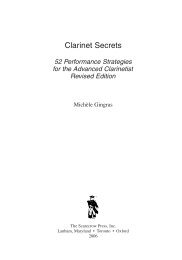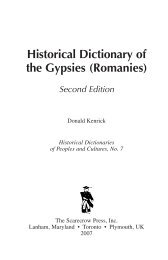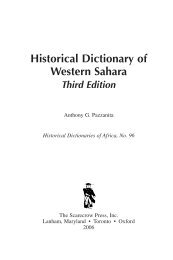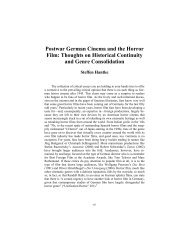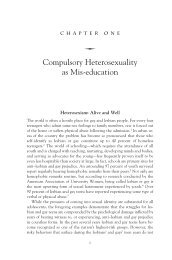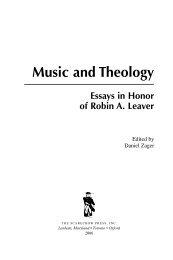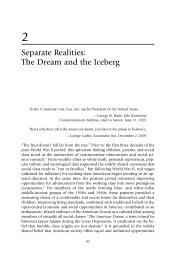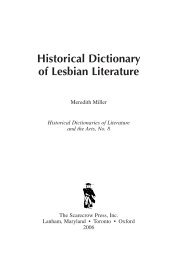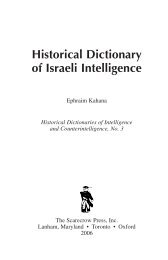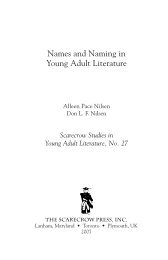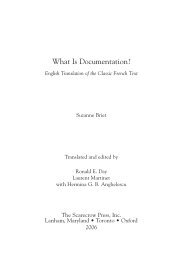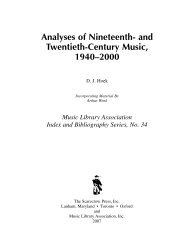Founded by Friends : the Quaker heritage of fifteen - Scarecrow Press
Founded by Friends : the Quaker heritage of fifteen - Scarecrow Press
Founded by Friends : the Quaker heritage of fifteen - Scarecrow Press
You also want an ePaper? Increase the reach of your titles
YUMPU automatically turns print PDFs into web optimized ePapers that Google loves.
xiv Thomas D. Hamm<br />
The Makefield <strong>Friends</strong>, however, spoke for an outlook that was increasingly<br />
embattled among <strong>Quaker</strong>s. Significantly, within two years <strong>of</strong><br />
<strong>the</strong>ir protest, <strong>the</strong> first public discussion <strong>of</strong> <strong>the</strong> possibility <strong>of</strong> a <strong>Quaker</strong> college<br />
appeared in print. In <strong>the</strong> Philadelphia <strong>Quaker</strong> weekly <strong>the</strong> Friend, an<br />
anonymous Friend argued that <strong>Quaker</strong>s repudiated higher education because<br />
<strong>of</strong> “unfounded prejudice.” Early <strong>Friends</strong>, he asserted, had not objected<br />
to higher education on principle, just <strong>the</strong> universities <strong>of</strong> <strong>the</strong> seventeenth<br />
century, with <strong>the</strong>ir “crowds <strong>of</strong> dogmatic and self-sufficient<br />
pedants” who were concerned largely with producing aristocratic fops<br />
and “hireling priests.” Now, however, a significant number <strong>of</strong> young<br />
<strong>Friends</strong>, seeking useful learning, had no choice but to find it outside <strong>the</strong><br />
Society <strong>of</strong> <strong>Friends</strong>, in colleges under <strong>the</strong> control <strong>of</strong> o<strong>the</strong>r denominations.<br />
<strong>Friends</strong>, if <strong>the</strong>y wished to hold <strong>the</strong>ir best and brightest young people,<br />
should no longer resist “keeping pace with <strong>the</strong> progress <strong>of</strong> knowledge.”<br />
This impulse would be critical in <strong>the</strong> founding <strong>of</strong> Haverford in 1833 and<br />
its formal transformation into a college in 1856.<br />
This intellectual ferment took place against a background <strong>of</strong> controversy<br />
and division among <strong>Friends</strong>. The first split came in 1827–1828, as<br />
American <strong>Friends</strong> divided into Hicksite and Orthodox groups. Hicksite<br />
<strong>Friends</strong> took <strong>the</strong>ir name from <strong>the</strong>ir leader, <strong>the</strong> Long Island minister Elias<br />
Hicks (1748–1830). Hicks emphasized <strong>the</strong> authority <strong>of</strong> <strong>the</strong> Inner Light <strong>of</strong><br />
Christ within each individual over that <strong>of</strong> <strong>the</strong> Bible and sometimes suggested<br />
Christ achieved divinity ra<strong>the</strong>r than being born divine. Orthodox<br />
<strong>Friends</strong> were those who held views on <strong>the</strong>se subjects similar to those <strong>of</strong><br />
evangelical Protestants. Hicksites tended to see <strong>the</strong> Orthodox as overly influenced<br />
<strong>by</strong> non-<strong>Quaker</strong> evangelicals and were <strong>of</strong>ten skeptical <strong>of</strong> <strong>the</strong> social<br />
and economic changes <strong>the</strong>y saw taking place around <strong>the</strong>m. (Makefield<br />
Monthly Meeting, which was so dubious about boarding schools,<br />
was a Hicksite stronghold.) The Orthodox responded with charges that<br />
Hicks was a disciple <strong>of</strong> <strong>the</strong> notorious freethinker Thomas Paine. Hicksites<br />
were strongest in <strong>the</strong> Delaware Valley, New York, and around Baltimore<br />
and in nor<strong>the</strong>rn Virginia. Orthodox <strong>Friends</strong> dominated New England, <strong>the</strong><br />
<strong>Quaker</strong> communities <strong>of</strong> sou<strong>the</strong>rn Virginia and North Carolina, and those<br />
west <strong>of</strong> <strong>the</strong> Appalachian Mountains. Both groups, in turn, saw more splits<br />
in <strong>the</strong> 1840s and 1850s. Hicksites lost a significant number <strong>of</strong> <strong>Friends</strong> who<br />
were drawn into radical reform movements that more conservative Hicksites<br />
saw as threatening <strong>Quaker</strong> distinctiveness. At <strong>the</strong> same time, Orthodox<br />
<strong>Friends</strong> were dividing into Gurneyite and Wilburite groups. The former<br />
took <strong>the</strong>ir name from <strong>the</strong> English <strong>Quaker</strong> minister Joseph John<br />
Gurney (1788–1847), who had himself studied at Oxford under a series <strong>of</strong><br />
tutors without formally entering <strong>the</strong> university. Gurney advocated an<br />
evangelical vision <strong>of</strong> <strong>Quaker</strong>ism that encouraged ties with o<strong>the</strong>r evangelicals<br />
in good causes, including education. The overwhelming majority <strong>of</strong>


